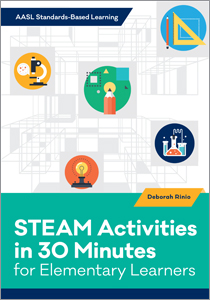Primary tabs
You don't need to be an ALA Member to purchase from the ALA Store, but you'll be asked to create an online account/profile during checkout to proceed. This Web Account is for both Members and non-Members. Note that your ALA Member discount will be applied at the final step of the checkout process.
If you are Tax-Exempt, please verify that your account is currently set up as exempt before placing your order, as our new fulfillment center will need current documentation. Learn how to verify here.
- Description
- Table of Contents
- About the author
- Reviews
For district bulk purchases, State Affiliate events, LIS students, and other special purchasing arrangements, please contact us at editionsmarketing@ala.org.
Read a blog post by the author now!
Using STEAM activities, this book places school librarians at the intersection with inquiry in an elementary school. Learners will think like a scientist and design like an engineer using an iterative process to make authentic learning connections and develop a growth mindset. Designed to be completed in 30-minute class periods, 14 scaffolded STEAM activities allow school librarians to easily shift the same lesson between classes and grade levels. National School Library Standards alignments with STEAM content area standards promote instructional partnerships focused on teaching inquiry, collaboration, and learner-driven exploration, making STEAM a perfect approach for the elementary school library. An invaluable timesaver, this resource provides
- activities scaffolded for grade bands K-2, 3-4, and 5-6, engaging learners at greater levels of complexity or cognition;
- alignments to the AASL Standards Framework for Learners, the Next Generation Science Standards, and the National Core Arts Standards;
- science background for school librarians and other educators who may be unfamiliar with the STEAM concepts being explored;
- sample assessments, technology integration, collaboration and growth mindset tips, suggested picture books, and more.
This tool will inspire school librarians and other educators to create opportunities to engage in STEAM practices, collaboratively writing and assessing their own scaffolded lesson plans.
Acknowledgements
Introduction: Using a STEAM Approach in the Classroom and the School Library
Part I: Understanding STEAM and its role in the Elementary School Library
Chapter 1: Why STEAM?
Chapter 2: Applying a Growth Mindset
Part II: STEAM Activities
Chapter 3: Thinking Like a Scientist
- Imagining: Exploring Scientists
- Making a Tissue Box Guitar: Exploring Sound
- Making Dye: Examining Color
- Making a Spiderweb: Insect Exploration
- Fast Surfaces: Experimenting with Friction
- Melted Crayons: States of Matter
- String Art: Exploring Patterns
Chapter 4: Designing Like an Engineer
- Working Together: Build a Tower Challenge
- Building a Flashlight: Looking at Circuits
- Building a Rube Goldberg Machine: Engineering Challenge
- Designing a Thermos: Exploring Heat
- Ready to Recycle: Trash to Treasure Challenge
- Bobbing Boats: Floating and Sinking
- Coding with Cups: Design a Structure Using Code
Part III: Making STEAM Work for You
Chapter 5: Writing your own Scaffolded Lesson Plans
Chapter 6: Strategies for Collaboration
Chapter 7: Assessing Learners Work
Conclusion: Moving from Inspiration to Collaboration
Appendix
Bibliography
Contributor
Index
Deborah Rinio
Deborah Rinio, PhD is a former school librarian from Fairbanks, Alaska. She is currently an Assistant Teaching Professor for the School Library Certification Program at Montana State University Bozeman and teaches as an Adjunct Instructor at the University of Alaska Fairbanks. She was a school librarian in elementary, middle, and high schools for the Fairbanks North Star Borough School District. She was on the AASL Standards and Guidelines Editorial Board that developed the National School Library Standards. She has served on various boards and committees including the ALA Policy Corps, Alaska Association of School Librarians, and Alaska Library Association. She is published in VOYA, Knowledge Quest, School Library Connection, and School Libraries Worldwide.
"Elementary school librarians who want to get their students thinking like scientists and designing like engineers should turn to Rinio’s collection of STEAM lessons. Mindful that library classes are often constrained by a 30-minute time frame and by frequent change of grade levels, Rinio has developed easily scaffolded lessons around a central topic ... Incorporating STEAM in the library will stimulate curiosity in students, leading librarians to a wealth of opportunities to foster lifelong learners. Highly recommended for elementary school librarians seeking to prioritize STEAM."
— School Library Journal



